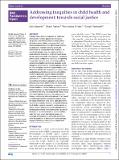Files in this item
Addressing inequities in child health and development : towards social justice
Item metadata
| dc.contributor.author | Spencer, Nick | |
| dc.contributor.author | Raman, Shanti | |
| dc.contributor.author | O'Hare, Bernadette Ann-Marie | |
| dc.contributor.author | Tamburlini, Giorgio | |
| dc.date.accessioned | 2019-08-02T14:30:05Z | |
| dc.date.available | 2019-08-02T14:30:05Z | |
| dc.date.issued | 2019-08-01 | |
| dc.identifier | 260282187 | |
| dc.identifier | a7d4da96-e62f-4799-bcd5-6e9446502165 | |
| dc.identifier | 85073041599 | |
| dc.identifier | 000655592900036 | |
| dc.identifier.citation | Spencer , N , Raman , S , O'Hare , B A-M & Tamburlini , G 2019 , ' Addressing inequities in child health and development : towards social justice ' , BMJ Paediatrics Open , vol. 3 , no. 1 , e000503 . https://doi.org/10.1136/bmjpo-2019-000503 | en |
| dc.identifier.issn | 2399-9772 | |
| dc.identifier.uri | https://hdl.handle.net/10023/18237 | |
| dc.description.abstract | Inequities have a profound impact on the health and development of children globally. While inequities are greatest in the world’s poorest countries, even in rich nations poorer children have poorer health and developmental outcomes. From birth through childhood to adolescence, morbidity, mortality, growth and development are socially determined, resulting in the most disadvantaged having the highest risk of poor health outcomes. Inequities in childhood impact across the life course. We consider four categories of actions to promote equity: strengthening individuals, strengthening communities, improving living and working conditions, and promoting healthy macropolicies. Inequities can be reduced but action to reduce inequities requires political will. The International Society for Social Paediatrics and Child Health (ISSOP) calls on governments, policy makers, paediatricians and professionals working with children and their organisations to act to reduce child health inequity as a priority. ISSOP recommends the following: governments act to reduce child poverty; ensure rights of all children to healthcare, education and welfare are protected; basic health determinants such as adequate nutrition, clean water and sanitation are available to all children. Paediatric and child health organisations ensure that their members are informed of the impact of inequities on children’s well-being and across the life course; include child health inequities in curricula for professionals in training; publish policy statements relevant to their country on child health inequities; advocate for evidence-based pro-equity interventions using a child rights perspective; advocate for affordable, accessible and quality healthcare for all children; promote research to monitor inequity as well as results of interventions in their child populations. Paediatricians and child health professionals be aware of the impact of social determinants of health on children under their care; ensure their clinical services are accessible and acceptable to all children and families within the constraints of their country’s health services; engage in advocacy at community and national level. | |
| dc.format.extent | 6 | |
| dc.format.extent | 441807 | |
| dc.language.iso | eng | |
| dc.relation.ispartof | BMJ Paediatrics Open | en |
| dc.subject | RJ Pediatrics | en |
| dc.subject | 3rd-NDAS | en |
| dc.subject | SDG 3 - Good Health and Well-being | en |
| dc.subject | SDG 6 - Clean Water and Sanitation | en |
| dc.subject.lcc | RJ | en |
| dc.title | Addressing inequities in child health and development : towards social justice | en |
| dc.type | Journal item | en |
| dc.contributor.institution | University of St Andrews. School of Medicine | en |
| dc.contributor.institution | University of St Andrews. Infection and Global Health Division | en |
| dc.identifier.doi | https://doi.org/10.1136/bmjpo-2019-000503 | |
| dc.description.status | Peer reviewed | en |
This item appears in the following Collection(s)
Items in the St Andrews Research Repository are protected by copyright, with all rights reserved, unless otherwise indicated.

